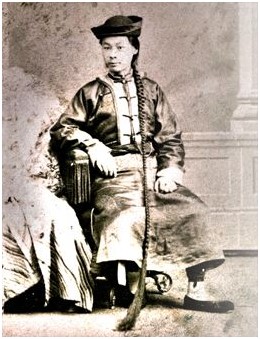Wong Chin Foo
USINFO | 2013-08-05 15:42

Wong Chin Foo (Chinese: 王清福; pinyin: Wáng Qīngfú) was a Chinese-born journalist, lecturer, and writer, one of the most prolific Chinese writers in the San Francisco press of the 19th century.
Wong was born in Jimo, Shandong province, in 1847 to a well off family which soon lost its money during the Taiping Rebellion. In 1861, he was taken in by a missionary couple, and was baptized into the Baptist faith and came to the United States in 1867. In the following years he studied at a preparatory school in Washington, D.C. and University at Lewisburg (later renamed Bucknell University) in Lewisburg, Pennsylvania in 1869-70. He returned to China in 1870 and became an interpreter for the Chinese Maritime Customs Service in Shanghai and Zhenjiang. In 1872 he was excommunicated from the Shanghai Baptist Church and in 1873, after the birth of his son, forced out of China for his revolutionary activism.
He then moved to Japan and (in 1873) back to the U.S. In the U.S., he lived mostly in the East and Midwest, traveling and lecturing. He founded a weekly newspaper, The Chinese American, in New York City in 1883, the country's first association of Chinese American voters in 1884, and the Chinese Equal Rights League to campaign against the U.S. policy of Chinese Exclusion in 1892. His work was published in periodicals including the North American Review and Chautauquan. When a visitor to a saloon in New York's Chinatown accused a Chinese grocery of handling small cats and rats, Wong offered $500 reward for anyone who could prove that Chinese ate cats or rats, an offer which was not taken up. The incident provoked Wong into writing an article on Chinese food for the Brooklyn Eagle which offers a rich description of Chinese cooking, in which he says "chop soly", that is, Chop Suey "may justly be called the national dish of China" (though it is not the dish usually called Chop Suey in the United States).
His 1887 essay "Why Am I a Heathen?" explains his rejection of Christianity in favor of traditional Chinese beliefs; it prompted a response that same year, "Why I Am Not a Heathen", written by his fellow Chinese immigrant Yan Phou Lee, a devout Christian.
Wong went up repeatedly against anti-Chinese activist Denis Kearney, heckling him and at one point challenging him to a duel, and giving Kearney his choice of weapon: chopsticks, Irish potatoes, or Krupp guns. In 1904, he approved of Sun Yat-Sen's revolutionary message.
In 1898, he left the United States for a family reunion in China. In Hong Kong, he applied for a United States passport, which was issued but quickly revoked on orders from the State Department in Washington. When he proceeded to Shandong, he died of heart failure in Weihai.
Share this page